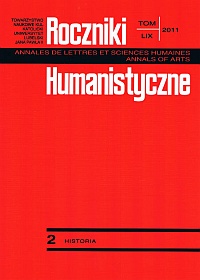Ku „jednej nieróżnej Rzeczypospolitej”. Król Zygmunt August wobec idei unii polsko-litewskiej
Abstrakt
The issue of the Polish-Lithuanian Union that became one of the main executionist postulates put forward by the nobility at the sessions of the Sejm from the beginning of King Sigismund II Augustus' reign in Poland (1548-1572); it was also one of the main subjects of the monarch's correspondence with his most important Lithuanian political partners – Mikołaj Radziwiłł “Rudy” (the Red) (about 1515-1584) and Mikołaj Radziwiłł “Czarny” (the Black) (1515-1565). In the King's letters it is easy to observe the tactic that for nearly 20 years allowed to efficiently stop the plan of forming a Polish-Lithuanian real union that threatened the dynastic interests of the Jagiellons – a prohibition of pro-union propaganda and forming an anti-union Lithuanian party around the Radziwiłłs, obstruction, apparent concessions, winning deputies and senators against other ones, skilful temporization. Letters unambiguously show that the change in the attitude towards the question of the Union that took place at the beginning of the 1560s was for Sigismund II Augustus a derivative of the accepted solution to the issue of Livonia; the King took the position that it is only by way of forming a union of Poland and Lithuania that military security and territorial integrity of the Grand Duchy of Lithuania can be ensured. However, passing from a radically anti-union position to one of its main advocate and animator Sigismund Augustus did not change his basic postulate, namely, that Poland and Lithuania should remain separate countries and the union between them should be based on the principle of equality of both partners. It was exactly the last of the Jagiellons who decided about federation as the form of the union of the Crown (Poland) and Lithuania.
Bibliografia
Bardach J.: Od aktu w Krewie do Zaręczenia Wzajemnego Obojga Narodów (1385-1791), w: Unia lubelska i tradycje integracyjne w Europie Środkowo--Wschodniej, red. J. Kłoczowski, P. Kras, H. Łaszkiewicz, Lublin 1999, s. 12-44.
Bardach J.: Związek Polski z Litwą, w: Polska w epoce Odrodzenia: państwo, społeczeństwo, kultura, red. A. Wyczański, wyd. 2, Warszawa 1986, s. 108-161.
Dubas - Urwanowicz E.: Stanowisko Polski wobec unii z Litwą w latach1562-1574, w: Unia lubelska i tradycje integracyjne w Europie Środkowo--Wschodniej, red. J. Kłoczowski, P. Kras, H. Łaszkiewicz, Lublin 1999, s. 98-94.
Dubas - Urwanowicz E.: Stosunek Korony do unii z Litwą w latach 1562-1574, „Studia Podlaskie” 5 (1995), s. 5-39.
Ferenc M.: Mikołaj Radziwiłł „Rudy” (ok. 1515-1584). Działalność polityczna i wojskowa, Kraków 2008.
Halecki O.: Dzieje unii jagiellońskiej, t. 2: W XVI wieku, Kraków 1920.
Jasnowski J.: Mikołaj Czarny Radziwiłł (1515-1565), kanclerz i marszałek ziemski Wielkiego Księstwa Litewskiego, wojewoda wileński, Warszawa 1939 (Rozprawy Historyczne Towarzystwa Naukowego Warszawskiego, t. 22).
Konopka A.: Problem unii polsko-litewskiej w listach króla Zygmunta Augusta do Radziwiłłów, „Ibidem. Rocznik Koła Naukowego Historyków Studentów Katolickiego Uniwersytetu Lubelskiego Jana Pawła II” 5 (2008), s. 37-62.
Kosman M.: Między Krewem a Grodnem. (Uwagi o integracji Litwy z Polską w dobie przedrozbiorowej), w: Z dziejów Europy Środkowo-Wschodniej. Księga pamiątkowa ofiarowana prof. dr. hab. Władysławowi A. Serczykowi w 60. rocznicę urodzin, red. E. Dubas-Urwanowicz, A. Mironowicz, H. Parafianowicz, Białystok 1995, s. 135-142.
Sucheni - Grabowska A., Zygmunt August król polski i wielki książę litewski 1520-1562, Warszawa 1996.
Copyright (c) 2011 Roczniki Humanistyczne

Utwór dostępny jest na licencji Creative Commons Uznanie autorstwa – Użycie niekomercyjne – Bez utworów zależnych 4.0 Międzynarodowe.





